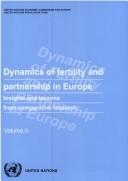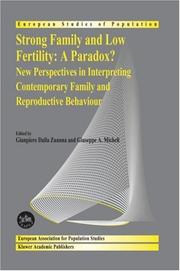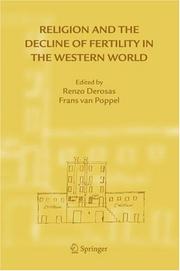| Listing 1 - 9 of 9 |
Sort by
|
Book
ISBN: 9782296545694 2296545696 Year: 2011 Publisher: Paris Harmattan
Abstract | Keywords | Export | Availability | Bookmark
 Loading...
Loading...Choose an application
- Reference Manager
- EndNote
- RefWorks (Direct export to RefWorks)
Motherhood --- Feminism --- Women's rights --- Women --- Maternité --- Féminisme --- Femmes --- History --- Political aspects --- Social aspects --- Social conditions --- Histoire --- Aspect politique --- Aspect social --- Droits --- Conditions sociales --- Neo-Malthusianism --- #SBIB:314H232 --- #SBIB:316.356.2H3621 --- #SBIB:316.346H29 --- Malthusianism --- Maternity --- Mothers --- Parenthood --- History. --- Vruchtbaarheid --- Gezinssociologie: vruchtbaarheid: Westers maatschappijen --- Positie van de vrouw in de samenleving: andere topics --- France --- Sociology - Feminism - Women studies - Motherhood - 20th century. --- Social aspects. --- Maternité --- Féminisme
Book
ISBN: 9781845455736 1845455738 9780857453655 0857453653 Year: 2012 Publisher: New York Berghahn
Abstract | Keywords | Export | Availability | Bookmark
 Loading...
Loading...Choose an application
- Reference Manager
- EndNote
- RefWorks (Direct export to RefWorks)
Interest in the study of kinship, a key area of anthropological enquiry, has recently reemerged. Dubbed ‘the new kinship’, this interest was stimulated by the ‘new genetics’ and revived interest in kinship and family patterns. This volume investigates the impact of biotechnology on contemporary understandings of kinship, of family and ‘belonging’ in a variety of European settings and reveals similarities and differences in how kinship is conceived. What constitutes kinship for different publics? How significant are biogenetic links? What does family resemblance tell us? Why is genetically modified food an issue? Are ‘genes’ and ‘blood’ interchangeable? It has been argued that the recent prominence of genetic science and genetic technologies has resulted in a ‘geneticization’ of social life; the ethnographic examples presented here do show shifts occurring in notions of ‘nature’ and of what is ‘natural’. But, they also illustrate the complexity of contemporary kinship thinking in Europe and the continued interconnectedness of biological and sociological understandings of relatedness and the relationship between nature and nurture.
Artificial insemination, Human --- Human reproduction --- Kinship --- Social aspects --- Insémination artificielle humaine --- #SBIB:316.356.2H3621 --- Gezinssociologie: vruchtbaarheid: Westers maatschappijen --- Insémination artificielle humaine --- Parenté --- Reproduction humaine --- Aspect social --- #SBIB:314H230 --- #SBIB:39A11 --- Donor insemination, Human --- Human artificial insemination --- Human donor insemination --- Fertiliteit: algemeen --- Antropologie : socio-politieke structuren en relaties --- Ethnology --- Clans --- Consanguinity --- Families --- Kin recognition --- Human physiology --- Reproduction --- Reproductive health --- Reproductive rights --- Human reproductive technology

ISBN: 1417558008 9211168074 9211168090 9211168082 9781417558001 9789211168082 9789211168099 9789211168075 Year: 2002 Publisher: New York, N.Y. United Nations
Abstract | Keywords | Export | Availability | Bookmark
 Loading...
Loading...Choose an application
- Reference Manager
- EndNote
- RefWorks (Direct export to RefWorks)
314.6 <4> --- #SBIB:316.356.2H3621 --- Gezinnen. Huishoudingen --(demografie)--Europa --- Gezinssociologie: vruchtbaarheid: Westers maatschappijen --- Population research --- 314.6 <4> Gezinnen. Huishoudingen --(demografie)--Europa --- Families --- Fertility, Human --- 314.3 --- 314.6 --- #SBIB:314H230 --- Population --- Human fertility --- Natality --- Demography --- Human reproduction --- Infertility --- 314.3 Vruchtbaarheid. Nataliteit --(demografie) --- Vruchtbaarheid. Nataliteit --(demografie) --- Fertiliteit: algemeen --- Research --- Europe --- Family --- E-books --- Family life --- Family relationships --- Family structure --- Relationships, Family --- Structure, Family --- Social institutions --- Birth order --- Domestic relations --- Home --- Households --- Kinship --- Marriage --- Matriarchy --- Parenthood --- Patriarchy --- Social aspects --- Social conditions
Book
ISBN: 9783039113118 3039113119 Year: 2007 Volume: 7 Publisher: Bern Lang
Abstract | Keywords | Export | Availability | Bookmark
 Loading...
Loading...Choose an application
- Reference Manager
- EndNote
- RefWorks (Direct export to RefWorks)
Sociology of the family. Sociology of sexuality --- Demography --- Western Europe --- Fertility, Human --- Women --- Family demography --- Demographic transition --- Fecondite --- Femmes --- Démographie de la famille --- Transition demographique --- Congresses. --- Social conditions --- History --- Congrès --- Conditions sociales --- Histoire --- Birth control --- #SBIB:314H230 --- #SBIB:316.356.2H3621 --- Fertiliteit: algemeen --- Gezinssociologie: vruchtbaarheid: Westers maatschappijen --- Démographie de la famille --- Congrès --- Human fertility --- Natality --- Transition, Demographic --- Vital revolution (Demography) --- Population control --- Pregnancy --- Prevention --- Human reproduction --- Infertility --- Families --- Population --- Vital statistics --- Family planning --- Contraception --- Reproductive rights --- Research --- Fertilité humaine --- Dynamique de la population
Book
ISBN: 9781107055582 9781107650251 9781107295377 110705558X 1107650259 1107295378 1316309266 1316288536 Year: 2015 Publisher: Cambridge Cambridge University Press
Abstract | Keywords | Export | Availability | Bookmark
 Loading...
Loading...Choose an application
- Reference Manager
- EndNote
- RefWorks (Direct export to RefWorks)
Modern Families brings together research on parenting and child development in new family forms including lesbian mother families, gay father families, families headed by single mothers by choice and families created by assisted reproductive technologies such as in vitro fertilisation (IVF), egg donation, sperm donation, embryo donation and surrogacy. This research is examined in the context of the issues and concerns that have been raised regarding these families. The findings not only contest popular myths and assumptions about the social and psychological consequences for children of being raised in new family forms but also challenge well-established theories of child development that are founded upon the supremacy of the traditional family. It is argued that the quality of family relationships and the wider social environment are more influential in children's psychological development than are the number, gender, sexual orientation, or biological relatedness of their parents or the method of their conception.
Parenting --- Child Development --- Families --- Mother and child --- Parenting. --- Child development. --- Families. --- Mother and child. --- Psychology --- Developmental --- General. --- Child development --- Child and mother --- Mother-child relationship --- Mothers and children --- Parent and child --- Family --- Family life --- Family relationships --- Family structure --- Relationships, Family --- Structure, Family --- Social institutions --- Birth order --- Domestic relations --- Home --- Households --- Kinship --- Marriage --- Matriarchy --- Parenthood --- Patriarchy --- Child study --- Children --- Development, Child --- Developmental biology --- Parent behavior --- Parental behavior in humans --- Child rearing --- Social aspects --- Social conditions --- Development --- #SBIB:316.356.2H1231 --- #SBIB:316.356.2H2221 --- #SBIB:316.356.2H3621 --- Gezins- en verwantschapsvormen: vormen van gezin en huishouding, relatievormen --- Gezinssociologie: ouders-kind relaties --- Gezinssociologie: vruchtbaarheid: Westers maatschappijen

ISBN: 1280190809 9786610190805 1402028377 1402028369 Year: 2004 Volume: 14 Publisher: Dordrecht Kluwer
Abstract | Keywords | Export | Availability | Bookmark
 Loading...
Loading...Choose an application
- Reference Manager
- EndNote
- RefWorks (Direct export to RefWorks)
New perspectives in interpreting contemporary family and reproductive - haviour of Mediterranean Europe 1. THE NEW GEOGRAPHY OF FERTILITY AND THE FAMILY IN EUROPE The countries of southern Europe have begun to reduce conjugal fertility at a later date compared to most other nations in the west. This has been - plained by means of the category of delay: the backwardness of the pr- esses of accumulation and economic development being seen as the cause of the maintaining of the reproductive models of the past. Moreover, the inf- ence of the Catholic Church in Italy, Spain and Portugal is supposed to have delayed the processes of secularisation, rendering difficult the changes in mentality necessary for assuming modern patterns of reproductive behaviour not only for fertility, but also for the variables which are strictly linked to it, such as sexuality, contraception and abortion (Livi Bacci, 1977; Lesthaeghe and Wilson, 1986). 1. 1. The trends of very low fertility Now the panorama is very different. Since the mid-seventies, southern Europe has been washed by the tide of a lowest-low fertility (i. e. , TFR under 1. 5 for several a prolonged period, Billari et al. , 2003), which in some areas 1 has reached and maintained scarcely imaginable levels for years on end. Conversely, other areas of Europe, where fertility started to fall many d- ades earlier than in the regions of the sourth, have recovered or maintained considerably higher levels of fertility, often close to replacement level.
Fertility, Human --- Family size --- Families. --- Social aspects --- Family --- Families --- Family life --- Family relationships --- Family structure --- Relationships, Family --- Structure, Family --- Social institutions --- Birth order --- Domestic relations --- Home --- Households --- Kinship --- Marriage --- Matriarchy --- Parenthood --- Patriarchy --- Size of families --- Family planning --- Human fertility --- Natality --- Demography --- Human reproduction --- Infertility --- Social conditions --- Sociology of the family. Sociology of sexuality --- Italy --- Western Europe --- Fecondite --- Fécondité humaine --- Familles --- Aspect social --- Dimension --- EPUB-LIV-FT LIVSOCIA SPRINGER-B --- #SBIB:316.356.2H3621 --- #SBIB:314H232 --- #SBIB:044.AANKOOP --- Gezinssociologie: vruchtbaarheid: Westers maatschappijen --- Vruchtbaarheid

ISBN: 0813585619 0585025800 9780585025803 0813524326 0813524334 9780813585611 Year: 1997 Publisher: [Place of publication not identified] Rutgers University Press
Abstract | Keywords | Export | Availability | Bookmark
 Loading...
Loading...Choose an application
- Reference Manager
- EndNote
- RefWorks (Direct export to RefWorks)
This text argues that our perceptions about both pregnancy and infertility are limited by our culture's battles over the meaning of choice and control, arguments over what is natural or unnatural, and the troubled relationship between reproduction and the domestic sphere.When a woman in the United States becomes pregnant or tries to become pregnant, she enters a world of information, technology, and expertise. Suddenly her body becomes public in a new way: medicine, law, and popular culture all offer her sometimes contradictory "expert" advice. This text explores the advice offered to pregnant and infertile women by examining assumptions about femininity, class, and the reproductive body that structure the language of expertise. Even advice books written from a specifically countercultural or feminist point of view often attempt to police the way women think about their bodies. The authors here argue that our perceptions about both pregnancy and infertility are limited by our culture's battles over the meaning of choice and control, arguments over what is natural or unnatural, and the troubled relationship between reproduction and the domestic sphere.
Human reproductive technology --- Pregnancy literature --- Infertility literature --- Women --- Feminist theory --- Feminist criticism --- Feminism. --- Infertility. --- Pregnancy. --- Reproductive Techniques. --- Sociology. --- Criticism --- Feminism --- Feminist philosophy --- Feminist sociology --- Theory of feminism --- Medical literature --- Infertility --- Human females --- Wimmin --- Woman --- Womon --- Womyn --- Females --- Human beings --- Femininity --- Pregnancy --- General Social Development and Population --- Reproduction Technics --- Reproduction Techniques --- Reproductive Technologies --- Technology, Reproductive --- Reproductive Technology --- Reproduction Technic --- Reproduction Technique --- Reproductive Technique --- Technic, Reproduction --- Technics, Reproduction --- Technique, Reproduction --- Technique, Reproductive --- Techniques, Reproduction --- Techniques, Reproductive --- Technologies, Reproductive --- Selective Breeding --- Reproductive Medicine --- Reproductive Health Services --- Gestation --- Pregnancies --- Litter Size --- Maternal-Fetal Relations --- Pregnant Women --- Reproductive Sterility --- Sterility, Reproductive --- Sub-Fertility --- Subfertility --- Sterility --- Fertility --- Feminist Ethics --- Ethics, Feminist --- Women's Rights --- Social aspects --- Socialization --- Philosophy --- lichaam --- vruchtbaarheid (fertiliteit, onvruchtbaarheid, steriliteit) --- zwangerschap --- #SBIB:316.346H20 --- #SBIB:316.356.2H3621 --- #SBIB:AANKOOP --- corps --- fertilité (infertilité, sterilité) --- grossesse --- Positie van de vrouw in de samenleving: algemeen --- Gezinssociologie: vruchtbaarheid: Westers maatschappijen --- Infertility literature. --- Women. --- Feminist theory. --- Feminist criticism. --- Social aspects. --- Socialization.

ISBN: 9781402051890 1402051891 9786610634828 1280634820 1402051905 Year: 2006 Publisher: Dordrecht Springer
Abstract | Keywords | Export | Availability | Bookmark
 Loading...
Loading...Choose an application
- Reference Manager
- EndNote
- RefWorks (Direct export to RefWorks)
The impact of religion on family and reproduction is one of the most fascinating and complex topics open to scholarly research. The linkage between family and religion has received no systematic treatment on a comparative basis, either in the social sciences or in historical studies. This book provides new insights into the relationships between religion and demography during the crucial period of the nineteenth and early twentieth century. Apart from providing a wealth of descriptive information on family life and fertility in different national and religious settings, the major strength of the book lies in its conceptual insights. The book will attract and stimulate readers at the advanced undergraduate or at the graduate level in history, religious studies, women’s studies, family studies, social demography, sociology, and anthropology due to its subject matter (moral issues related to fertility decline and family change played an important role in processes like secularisation, and religious secessions in the19th and 20th century), its analytical approach (all chapters make use of micro-level data on family and family size and use comparable statistical methods specifically suited for these kinds of data), and its theoretical orientation (the chapters explicitly focus on the variety of mechanisms via which religions had an effect on family life and fertility). The book is truly cross-cultural, showing the similarities as well as the differences in the positions of the various churches on matters important for reproduction in Western Europe, the US and Canada in the period 1850-1950. The consideration of the causes of variations in family size in the past provides a refreshing perspective on contemporary effects of religion on reproductive behaviour and the family. "This volume successfully promotes an agenda for research on the complex and diverse historical relationships between fertility, identity, community and religion." Simon Szreter, Fellow of St John's College, Cambridge "These well-researched and lucidly argued papers will provide important reading for all those interested in the religious history of the nineteenth century." Hugh McLeod is Professor of Church History at the University of Birmingham "This is a very valuable new resource for scholars, both established and new, to understand the role of religious institutions in family and demographic behavior and the ways in which those behaviors change across long periods of time." Arland Thornton, Director, Population Studies Center, University of Michigan "This book shows also that modern demographic and social history is able to revive the past in ways unthinkable only a generation ago." Massimo Livi-Bacci is Professor of Demography, University of Florence, and honorary president of the "International Union for the Scientific Study of Population".
Fertility, Human --- Human reproduction --- Religion and sociology --- Religious aspects --- Fertility, human --- Human reproduction. --- #SBIB:316.356.2H3621 --- #SBIB:316.356.2H1120 --- #SBIB:314H150 --- #SBIB:314H230 --- Gezinssociologie: vruchtbaarheid: Westers maatschappijen --- Historische demografie en demografische historiek: algemeen --- Fertiliteit: algemeen --- Fécondité humaine --- EPUB-LIV-FT LIVSOCIA SPRINGER-B --- Social sciences. --- Religion. --- History. --- Sociology. --- Demography. --- Psychotherapy. --- Counseling. --- Social Sciences. --- History, general. --- Religious Studies, general. --- Sociology, general. --- Psychotherapy and Counseling. --- Sociology of religion --- Sociology of the family. Sociology of sexuality --- Demography --- Fertility, Human. --- Religion and sociology. --- Religious aspects. --- Religion and society --- Religious sociology --- Society and religion --- Sociology, Religious --- Sociology and religion --- Sociology --- Human fertility --- Natality --- Infertility --- Sociologie religieuse --- Reproduction humaine --- Aspect religieux --- Applied psychology. --- Historical demography --- Social sciences --- Population --- Vital statistics --- Applied psychology --- Psychagogy --- Psychology, Practical --- Social psychotechnics --- Psychology --- Religion, Primitive --- Atheism --- God --- Irreligion --- Religions --- Theology --- Annals --- Auxiliary sciences of history --- Human physiology --- Reproduction --- Reproductive health --- Reproductive rights --- Gezinssociologie: historische studies over het gezin voor 1900 --- Counselling --- Helping behavior --- Psychology, Applied --- Clinical sociology --- Interviewing --- Personal coaching --- Social case work --- Therapy (Psychotherapy) --- Mental illness --- Mental health counseling --- Social theory --- Treatment --- Human reproduction - Religious aspects.
Book
ISBN: 0520059077 9780520059078 Year: 1988 Publisher: Berkeley University of California Press
Abstract | Keywords | Export | Availability | Bookmark
 Loading...
Loading...Choose an application
- Reference Manager
- EndNote
- RefWorks (Direct export to RefWorks)
Family demography --- Fertility, Human --- Parenthood. --- Parenthood --- Family Characteristics --- Parents --- Fertility --- #SBIB:314H233 --- #SBIB:314H240 --- #SBIB:316.356.2H3621 --- Below Replacement Fertility --- Differential Fertility --- Fecundability --- Fertility Determinants --- Fertility Incentives --- Fertility Preferences --- Fertility, Below Replacement --- Marital Fertility --- Natural Fertility --- Subfecundity --- World Fertility Survey --- Fecundity --- Determinant, Fertility --- Determinants, Fertility --- Fertility Determinant --- Fertility Incentive --- Fertility Preference --- Fertility Survey, World --- Fertility Surveys, World --- Fertility, Differential --- Fertility, Marital --- Fertility, Natural --- Preference, Fertility --- Preferences, Fertility --- Survey, World Fertility --- Surveys, World Fertility --- World Fertility Surveys --- Parental Age --- Parenthood Status --- Stepparent --- Step-Parents --- Age, Parental --- Ages, Parental --- Parent --- Parental Ages --- Status, Parenthood --- Step Parents --- Step-Parent --- Stepparents --- Parental Consent --- Parental Notification --- Couples --- Family Demography --- Family Life Surveys --- Family Size, Average --- Family Size, Completed --- Family Size, Desired --- Family Size, Expected --- Family Size, Ideal --- Family and Household --- Generations --- Head of Household --- Households --- Matriarchy --- One-Person Household --- Patriarchy --- Family Size --- Average Family Size --- Average Family Sizes --- Characteristic, Family --- Characteristics, Family --- Completed Family Size --- Completed Family Sizes --- Demographies, Family --- Demography, Family --- Desired Family Size --- Desired Family Sizes --- Expected Family Size --- Expected Family Sizes --- Family Characteristic --- Family Demographies --- Family Life Survey --- Family Sizes --- Family Sizes, Average --- Family Sizes, Completed --- Family Sizes, Desired --- Family Sizes, Expected --- Family Sizes, Ideal --- Household --- Household Head --- Household Heads --- Household and Family --- Household, One-Person --- Households, One-Person --- Ideal Family Size --- Ideal Family Sizes --- Life Survey, Family --- Life Surveys, Family --- Matriarchies --- One Person Household --- One-Person Households --- Patriarchies --- Survey, Family Life --- Surveys, Family Life --- Families --- Demography --- Geboorteregeling --- Nuptialiteit en gezin --- Gezinssociologie: vruchtbaarheid: Westers maatschappijen --- Research --- United States --- Population --- Socioeconomic aspects
| Listing 1 - 9 of 9 |
Sort by
|

 Search
Search Feedback
Feedback About UniCat
About UniCat  Help
Help News
News